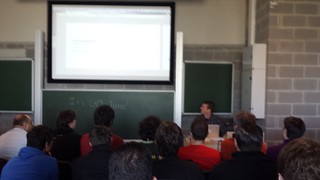First day of FOSDEM was great, and I choose to miss the opportunity of having too many Belgian beers in favor of getting some sleep for the next day. I got up, but was too slow at breakfast to be in time for the Logic programming in Python talk that I had aimed for. But instead, I got to be early to the Go devroom, which soon was overfull and had to stop letting new attendees in.
 The first Go talk was about Iris, a decentralized backend messaging service with broadcast, request / reply, publish / subscribe and tunnel semantics. It seemed really neat, the API was tiny and the lack of a central point was cool. But I'm afraid that the trade offs that was made to get it really simple might make it not flexible enough for real world usage.
The first Go talk was about Iris, a decentralized backend messaging service with broadcast, request / reply, publish / subscribe and tunnel semantics. It seemed really neat, the API was tiny and the lack of a central point was cool. But I'm afraid that the trade offs that was made to get it really simple might make it not flexible enough for real world usage.
Next Go talk, the one I was actually looking for, was Camlistore your personal storage system for life. A git like system for storing photos, blog posts, facebook likes and other personal data. Data and metadata are put into blobs which can be stored on the local filesystem or S3 or a bunch of other storage solutions. It tries to solve a problem that is common to me and lots of others: How to ensure you have your life data left and in control for the rest of your life? Not sure I would trust that Camlistore has nailed it this time, but it sure has potential. It was also the first time I learnt about Amazon Glacier, a service for storing backups charging tiny amounts for storage but larger amounts for retrieval (which probably will be worth it if you need it, right?)
 During lunch break, I skipped a session to try to find fine chocolate for gifts to bring home. Turned out to be a bad move since everything was closed on a Sunday. Lesson learned: never skip a FOSDEM talk. Heading back, it was time for MirageOS: compiling functional library operating systems in the biggest auditorium.
During lunch break, I skipped a session to try to find fine chocolate for gifts to bring home. Turned out to be a bad move since everything was closed on a Sunday. Lesson learned: never skip a FOSDEM talk. Heading back, it was time for MirageOS: compiling functional library operating systems in the biggest auditorium.
They where actually writing an OS kernel as a library in OCaml. They were able to compile a OCaml binary that deployed directly on top of Xen. I think it's a clever way to reduce the insane complexity that is imposed by a full GNU/Linux stack. Image sizes where < MB and it booted in 30 ms. But recompiling for every config change didn't seem great, and it's probably going to be a while before it'll get into production. I do think it's the future though. Reminds me of JRockit Virtual Edition.
Last year I spent most of my time in the Legal room. I find it fantastic that there are legal professionals that works with open source, and listening to them speaking gives me knowledge I would have a hard time to find on my own. This year my only visit was for Richard Fontana's talk Taking license compatibility semi-seriously. It was the funniest talk at FOSDEM this year and I laughed a lot, but it's hard to retell. I think his point was to not spend too much focus on discussing whether the Apache license is compatible with the GPL, since we're probably not gaining too much from doing so anyway.
 Last talk before heading to the airport was Persistent Memory -- Changing the Way We Store Data by Ric Wheeler, Redhat kernel filesystem director. Interesting because persistent memory is coming, and it has the potential to completely redefine how we design software by removing the difference between long term storage and working memory. But he predicts that we will continue to design software as we have in the past, and that the changes will be small. Persistent memory will still be more expensive than permanent storage. The mission for the kernel devs will be to provide a compatible interface.
Last talk before heading to the airport was Persistent Memory -- Changing the Way We Store Data by Ric Wheeler, Redhat kernel filesystem director. Interesting because persistent memory is coming, and it has the potential to completely redefine how we design software by removing the difference between long term storage and working memory. But he predicts that we will continue to design software as we have in the past, and that the changes will be small. Persistent memory will still be more expensive than permanent storage. The mission for the kernel devs will be to provide a compatible interface.
Missed the last talks. A pity because there are just so many great talks. The thing I love about FOSDEM is the great quantity and diversity of the talks. I get so much input from so many fields that I just wouldn't get exposed to during a normal work.